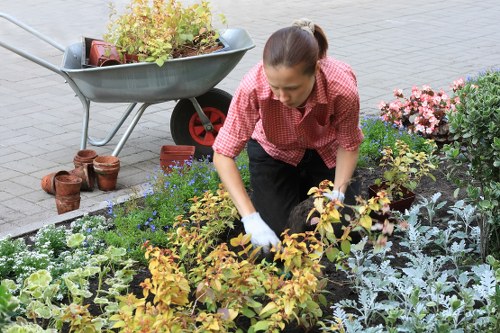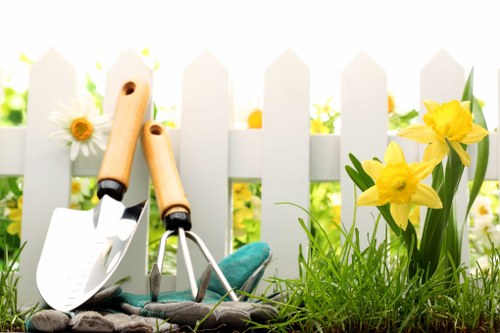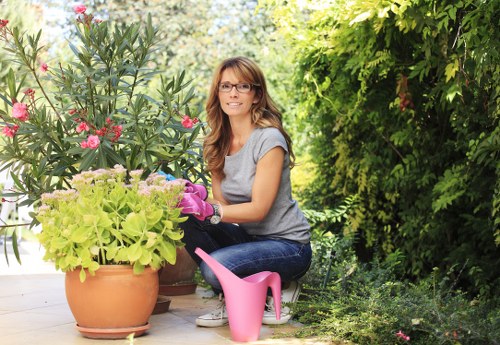Comprehensive Guide to Garden Maintenance in Ilford

Maintaining a beautiful garden in Ilford requires a combination of knowledge, effort, and the right strategies. Whether you're a seasoned gardener or a beginner, understanding the unique aspects of garden maintenance specific to Ilford's climate and soil conditions can make all the difference.
Ilford, located in the heart of East London, offers a temperate climate ideal for a variety of plants. However, the urban environment can pose challenges such as limited space, pollution, and varying soil quality. Effective garden maintenance in this area involves addressing these challenges while enhancing the aesthetic and functional aspects of your outdoor space.
In this article, we will explore essential tips and techniques for maintaining your garden in Ilford. From soil preparation and plant selection to seasonal care and pest management, we've got you covered.

Understanding Ilford's Climate and Soil
Before diving into garden maintenance, it's crucial to understand the local climate and soil conditions in Ilford. Ilford experiences a temperate maritime climate, characterized by mild summers and cool winters. This climate supports a wide range of plants, but it's essential to choose species that thrive in these conditions.
The soil in Ilford varies from sandy to clayey, with areas of loamy soil being most favorable for gardening. Conducting a soil test can help determine the pH level and nutrient content, allowing you to amend the soil as needed for optimal plant growth.
Proper soil preparation involves adding organic matter such as compost or well-rotted manure. This improves soil structure, enhances nutrient availability, and promotes beneficial microbial activity, all of which contribute to a healthy garden.

Essential Tools for Effective Garden Maintenance
Having the right tools is fundamental to efficient garden maintenance. Equipping yourself with quality tools can make tasks easier and ensure the longevity of your garden. Here are some essential tools every gardener in Ilford should have:
- Pruning Shears: For trimming and shaping plants.
- Garden Fork: Useful for turning soil and removing weeds.
- Spade: Essential for digging and planting.
- Hoe: Helps in weeding and cultivating the soil.
- Watering Can or Hose: For keeping your plants adequately hydrated.
Investing in ergonomic and durable tools will enhance your gardening experience and reduce the risk of injury.

Plant Selection for Ilford Gardens
Choosing the right plants is critical for a thriving garden. In Ilford, it's advisable to select plants that are well-suited to the local climate and soil conditions. Here are some recommended plants for gardens in Ilford:
- Perennials: Such as Lavender, Coreopsis, and Echinacea, which provide long-lasting blooms.
- Shrubs: Like Boxwood and Hydrangea, offering structure and greenery throughout the year.
- Vegetables: Tomatoes, Lettuce, and Herbs can be grown successfully with proper care.
- Annuals: Impatiens and Petunias for vibrant, seasonal color.
Incorporating a mix of these plants can create a balanced and visually appealing garden.

Seasonal Garden Maintenance Tips
Maintaining a garden in Ilford involves adapting your care routine to the changing seasons. Each season brings its own set of tasks to ensure your garden remains healthy and vibrant throughout the year.
Spring
- Start by cleaning up garden beds and removing any winter debris.
- Test and amend the soil as necessary.
- Plant new seedlings and perennials.
- Begin regular watering and fertilizing schedules.
Summer
- Ensure consistent watering, especially during dry spells.
- Prune and deadhead flowers to encourage continuous blooming.
- Monitor for pests and diseases, taking prompt action when needed.
- Mulch to retain soil moisture and suppress weeds.
Autumn
- Rake fallen leaves and clear garden beds.
- Plant bulbs for spring blooms.
- Trim perennials and prepare plants for winter.
- Reduce watering frequency as temperatures drop.
Winter
- Protect sensitive plants with mulch or covers.
- Prune dormant trees and shrubs.
- Plan and design your garden layout for the upcoming year.
- Maintain and store gardening tools properly.

Soil Health and Fertilization
Healthy soil is the foundation of a thriving garden. Regularly assessing and improving soil health can lead to better plant growth and resilience against pests and diseases.
Fertilization is a key aspect of maintaining soil health. Using organic fertilizers such as compost, manure, or bone meal can provide essential nutrients without harming the environment. It's important to follow a fertilization schedule tailored to the specific needs of your plants.
Additionally, incorporating cover crops and green manures can improve soil structure and fertility naturally. These practices help in maintaining a sustainable and productive garden.

Pest and Disease Management
Maintaining a garden in Ilford also involves protecting your plants from pests and diseases. Integrated Pest Management (IPM) is an effective approach that combines biological, cultural, and chemical methods to control pest populations.
Here are some strategies for effective pest and disease management:
- Regular Monitoring: Inspect plants frequently for signs of pests or disease.
- Encourage Beneficial Insects: Attract predators like ladybugs and lacewings that feed on harmful pests.
- Use Organic Treatments: Opt for neem oil or insecticidal soaps as safer alternatives to chemical pesticides.
- Maintain Garden Hygiene: Remove dead or diseased plant material to prevent the spread of pathogens.
Implementing these measures can help maintain a healthy and pest-free garden.

Watering Techniques for Optimal Growth
Proper watering is crucial for plant health, especially in an urban setting like Ilford where natural rainfall may be insufficient or inconsistent. Understanding the specific watering needs of your plants ensures they receive the right amount of moisture without overwatering.
Here are some effective watering techniques:
- Deep Watering: Water the soil thoroughly to reach deep roots, promoting stronger plant growth.
- Morning Routine: Watering in the early morning reduces evaporation and allows plants to absorb moisture before the heat of the day.
- Mulching: Apply a layer of mulch to retain soil moisture and regulate temperature.
- Drip Irrigation: Install a drip irrigation system for efficient and consistent watering.
By adopting these watering practices, you can ensure your garden remains lush and healthy throughout the growing season.

Lawn Care and Maintenance
A well-maintained lawn can significantly enhance the overall appearance of your garden. In Ilford, lawn care involves regular mowing, aeration, and proper fertilization to keep the grass healthy and green.
Here are some tips for effective lawn maintenance:
- Mowing: Maintain the grass at an optimal height to encourage thick growth and prevent weed invasion.
- Aeration: Aerate the soil annually to improve oxygen, water, and nutrient penetration to the roots.
- Fertilizing: Apply a balanced fertilizer during the growing season to provide essential nutrients.
- Weed Control: Use pre-emergent and post-emergent herbicides to manage weed growth.
Consistent lawn care practices will result in a vibrant and resilient lawn that serves as the centerpiece of your garden.

Hardscape Features and Their Maintenance
Incorporating hardscape elements like paths, patios, and fences adds structure and functionality to your garden. Proper maintenance of these features ensures they remain attractive and durable over time.
Here are some maintenance tips for common hardscape features:
- Paths and Walkways: Regularly sweep and clean to prevent debris buildup. Seal or reseal surfaces as needed to protect against weathering.
- Patios: Remove stains and moss to maintain a clean appearance. Check for cracks and repair them promptly.
- Fences: Inspect for damage or rot. Repaint or treat wooden fences to prevent deterioration.
By maintaining these hardscape features, you can enhance the longevity and beauty of your garden.

Pruning and Trimming Techniques
Pruning and trimming are essential for promoting healthy plant growth and maintaining the desired shape and size of your garden plants. Proper techniques ensure that plants remain vigorous and aesthetically pleasing.
Here are some guidelines for effective pruning and trimming:
- Remove Dead or Diseased Branches: This helps prevent the spread of diseases and encourages new growth.
- Shape Plants: Trim to maintain the desired form and to allow sufficient light and air circulation.
- Prune at the Right Time: Different plants have specific pruning schedules. Research the best time to prune each species in your garden.
- Use Sharp Tools: Clean, sharp tools make precise cuts and reduce the risk of damaging plants.
Regular pruning and trimming will keep your garden plants healthy and well-maintained.

Irrigation Systems for Efficient Water Use
Implementing an efficient irrigation system can save time and resources while ensuring your garden receives the right amount of water. In Ilford, where water conservation is important, choosing the appropriate irrigation method is key.
Here are some popular irrigation systems:
- Drip Irrigation: Delivers water directly to the plant roots, minimizing evaporation and runoff.
- Sprinkler Systems: Suitable for lawns and larger garden areas, providing broad coverage.
- Soaker Hoses: An affordable option for small to medium-sized gardens, allowing water to seep slowly into the soil.
- Timers and Controllers: Automate watering schedules, ensuring consistent hydration without manual intervention.
Choosing the right irrigation system based on your garden's size and plant types will enhance water efficiency and plant health.

Organic Gardening Practices
Adopting organic gardening practices not only benefits the environment but also promotes healthier plants. Organic methods focus on natural solutions for fertilization, pest control, and soil improvement.
Here are some key organic gardening practices:
- Composting: Transform kitchen scraps and garden waste into nutrient-rich compost to enrich the soil.
- Natural Pest Control: Use companion planting, beneficial insects, and organic sprays to manage pests.
- Crop Rotation: Rotate plant families each season to prevent soil depletion and reduce pest buildup.
- Organic Mulching: Apply organic mulches like straw or wood chips to retain moisture and suppress weeds.
Incorporating these practices into your garden maintenance routine can lead to a sustainable and productive garden.

Garden Lighting for Enhanced Ambiance
Proper lighting can transform your garden into a magical space, extending its use into the evening hours. Garden lighting not only enhances the aesthetic appeal but also improves safety and security.
Here are some tips for effective garden lighting:
- Path Lighting: Illuminate walkways to guide steps and prevent accidents.
- Accent Lighting: Highlight key garden features such as statues, fountains, or flowering plants.
- String Lights: Create a cozy and inviting atmosphere with decorative string lights.
- Solar Lights: An eco-friendly option that uses solar energy to power the lights.
Implementing a thoughtful lighting plan can enhance the beauty and functionality of your garden during nighttime.

Creating a Sustainable Garden
Sustainability in gardening involves practices that protect the environment, conserve resources, and promote biodiversity. A sustainable garden in Ilford can be both beautiful and eco-friendly.
Here are some strategies to create a sustainable garden:
- Use Native Plants: Native species are well-adapted to the local climate and require less maintenance.
- Rainwater Harvesting: Collect and use rainwater for irrigation, reducing reliance on potable water.
- Reduce Chemical Use: Opt for organic fertilizers and natural pest control methods.
- Promote Biodiversity: Incorporate a variety of plants to support different wildlife and beneficial insects.
Adopting these practices will contribute to a healthier environment and a more resilient garden.

Landscape Design and Planning
Effective landscape design is the blueprint for a well-organized and aesthetically pleasing garden. Planning your garden layout in advance ensures that each element complements the others, creating a harmonious outdoor space.
Consider the following when designing your garden:
- Layout: Decide on the structure and flow of your garden, including paths, planting beds, and feature areas.
- Plant Selection: Choose plants based on their size, color, and blooming season to create visual interest.
- Focal Points: Incorporate elements like fountains, sculptures, or seating areas to draw attention and add character.
- Functionality: Ensure the garden serves your needs, whether it's for relaxation, entertainment, or growing produce.
Thoughtful landscape design sets the foundation for a functional and attractive garden.

Maintaining Garden Health
Overall garden health is a reflection of your maintenance efforts. Regularly inspecting plants, addressing issues promptly, and maintaining healthy soil contribute to a vibrant and resilient garden.
Key aspects of maintaining garden health include:
- Regular Inspections: Check plants for signs of stress, pests, or diseases.
- Proper Nutrition: Ensure plants receive balanced nutrients through fertilization and soil amendments.
- Adequate Watering: Maintain consistent moisture levels appropriate for each plant species.
- Weed Management: Keep the garden free from weeds that compete with your plants for resources.
By focusing on these areas, you can ensure your garden remains healthy and thriving throughout the year.

Permaculture Principles in Garden Maintenance
Permaculture offers sustainable and efficient gardening practices that mimic natural ecosystems. Incorporating permaculture principles can enhance the productivity and sustainability of your Ilford garden.
Core permaculture principles include:
- Observe and Interact: Spend time understanding your garden's unique conditions and dynamics.
- Catch and Store Energy: Utilize resources like rainwater and solar energy for garden needs.
- Obtain a Yield: Ensure your garden provides tangible benefits, whether it's fruits, vegetables, or aesthetic pleasure.
- Apply Self-Regulation: Implement practices that maintain ecological balance and reduce waste.
Adopting permaculture can lead to a more resilient and self-sustaining garden.

Incorporating Wildlife into Your Garden
Attracting wildlife to your garden can enhance its vibrancy and support ecological balance. Birds, butterflies, and beneficial insects contribute to pollination and pest control.
Here are ways to encourage wildlife habitation:
- Provide Habitat: Install birdhouses, bat boxes, and insect hotels to offer shelter.
- Plant Diversity: Include a variety of plants that offer nectar, seeds, and shelter.
- Water Sources: Add birdbaths or small ponds to provide drinking and bathing water.
- Minimize Chemical Use: Reducing pesticides allows beneficial wildlife to thrive.
Creating a welcoming environment for wildlife contributes to a dynamic and healthy garden ecosystem.

Composting and Waste Management
Composting is an eco-friendly way to recycle garden and kitchen waste, turning it into nutrient-rich soil amendment. Effective composting practices contribute to soil health and reduce household waste.
To start composting in Ilford, follow these steps:
- Choose a Compost Bin: Select a bin that suits your space and volume of waste.
- Collect Organic Materials: Include kitchen scraps, garden trimmings, and yard waste.
- Maintain the Compost: Regularly turn the compost to aerate it and monitor moisture levels.
- Use the Compost: Once fully decomposed, apply the compost to your garden beds to enrich the soil.
Composting not only benefits your garden but also promotes environmental sustainability.

Garden Maintenance Schedule
Having a structured maintenance schedule helps in keeping your garden organized and ensures that essential tasks are not overlooked. Planning your activities throughout the year can lead to more efficient and effective garden care.
Here's a sample garden maintenance schedule for Ilford:
- January-February: Plan your garden layout and order seeds. Prune dormant trees and shrubs.
- March-April: Prepare soil, start seeds indoors, and begin planting early spring vegetables.
- May-June: Plant summer flowers, maintain irrigation systems, and control pests.
- July-August: Harvest vegetables, continue weeding, and monitor for pests.
- September-October: Plant bulbs for spring, rake leaves, and divide perennials.
- November-December: Mulch beds, protect plants from frost, and maintain tools.
Adhering to a maintenance schedule ensures that your garden remains healthy and beautiful throughout the year.

Conclusion: Achieving a Thriving Garden in Ilford
Effective garden maintenance in Ilford involves a blend of proper planning, regular care, and sustainable practices. By understanding the local climate, selecting suitable plants, and implementing efficient maintenance techniques, you can create and maintain a garden that is both beautiful and resilient.
Remember to adapt your maintenance routines to the changing seasons, utilize the right tools, and embrace organic and permaculture principles for a sustainable gardening experience. Whether you're cultivating flowers, vegetables, or creating a serene outdoor space, these strategies will help you achieve a thriving garden in Ilford.
Contact us today to learn more about professional garden maintenance services tailored to your needs. Let us help you transform your outdoor space into a lush and vibrant garden you can enjoy all year round.

